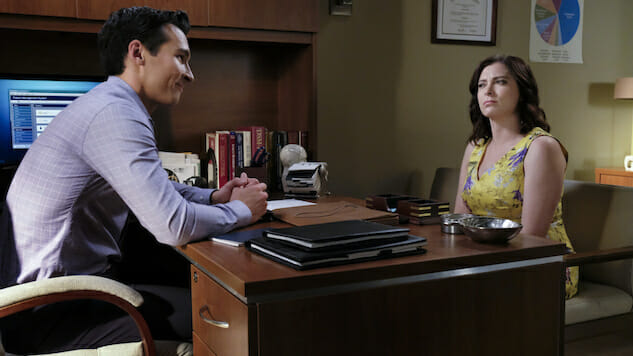How Crazy Ex-Girlfriend Became One of the Best Portraits of Mental Illness on TV
Photo: Scott Everett White/The CW
This story contains spoilers from tonight’s episode of Crazy Ex-Girlfriend, “Josh Is Irrelevant.”
By its very title, The CW musical comedy Crazy Ex-Girlfriend has always been a conundrum: How do you make a feminist series that tackles topics like depression, alcoholism and abortion with a title like that? And while last week’s episode is the series’ most serious to date—it ends with lead Rebecca Bunch (Rachel Bloom) nearly taking her own life—this week’s attempts an even more delicate balancing act: Diagnosing the character with borderline personality disorder without venturing into melodramatic sadness or assuming this means a bleak future.
Aline Brosh Mckenna, who co-created the series with Bloom and serves as its showrunner, told Paste and other journalists that, while the writers have known the character would “bottom out” since they set up her “history of suicidality” in the pilot, they—just like Rebecca—didn’t have the official diagnosis then, and “wrote her by feel for awhile.”
“We kind of wrote her behavior in a way that felt right to us for about a season and a half I would say,” she says. “It’s funny. We were trying to help Rebecca, so we were trying to figure out what was wrong with her, and as we looked into it, so much of this seemed to resonate for her. As you see in the episode, she really has a lot of the classic hallmarks of this behavior. The other thing is that even though [BPD] is extremely common, it’s very misunderstood. The people who suffer from it suffer from a really heartbreaking stigma because people don’t understand it, and there are psychiatrists who refuse to treat them because they’re very difficult to treat.”
Brosh Mckenna adds that the writers love the character and they “wanted to show the human aspect of somebody who thinks their diagnosis is going to be some sort of badge of honor, and then it’s something that she really doesn’t like.”
The peppy, sunny optimism of Rebecca’s song “My Diagnosis” in tonight’s episode is so powerful that Brosh Mckenna cried the first time Bloom played it for her. It’s a naïve hope that a visit to the psychiatrist will be no different from previous ones: Rebecca will be given a name for her disorder, a prescription or two, and be sent on her way. That it doesn’t happen this time around, and it takes awhile for her to accept it—an important moment of growth for the character who, shall we say, has a tendency for impulsive behavior. (Her life choices have, after all, included shagging her ex’s dad, drastically moving up her wedding date and—oh yeah—uprooting her life and moving across the country to a town she’d never heard of after running into her ex-boyfriend on the street. And that’s to say nothing of her propensity for inner monologues that feature show-stopping song and dance numbers.)
Mental illness, and TV’s treatment of it, have always been touchy subjects, especially with regard to accuracy. That Crazy Ex-Girlfriend follows in long line of series to tackle it—and that it’s almost always from a female perspective, as in FXX’s You’re the Worst, Lifetime’s UnReal and Maria Bamford’s autobiographical Netflix series, Lady Dynamite—is not lost on Brosh Mckenna. Partnering with Bloom and who she describes as their research-obsessed writer’s assistant, Ilana Peña, she looked at things like the character’s history of depression and bouts of insomnia and anxiety to find something that “unites all of those things for her.”
“I think that sometimes in these shows with anti-heroes, you kind of keep them frozen there so you can maintain the pathology,” Brosh Mckenna says. “But she still has underlying issues to address. She still does, and always will. So it doesn’t mean that she’s fixed.”
-

-

-

-

-

-

-

-

-

-

-

-

-

-

-

-

-

-

-

-

-

-

-

-

-

-

-

-

-

-

-

-

-

-

-

-

-

-

-

-








































